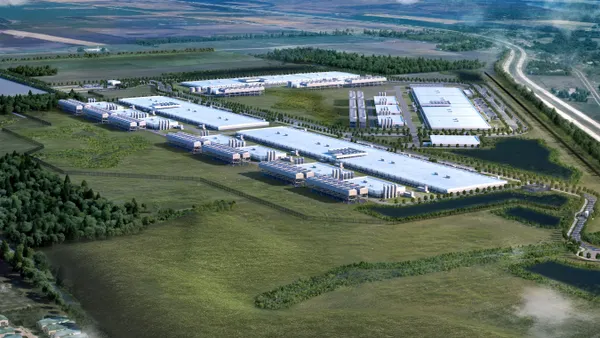Dive Brief:
- Federal contractors must be fully vaccinated against COVID-19 by Dec. 8, the Biden administration said Friday. The new guidance details how agencies and federal contractors should comply with President Joe Biden's Sept. 9 executive order.
- The protocols will apply to all covered contractor employees, including "contractor or subcontractor employees in covered contractor workplaces who are not working on a federal government contract or contract-like instrument," the guidance reads.
- Associated Builders and Contractors said that although vaccinations are important for the construction workforce, the new regulations will add to already overburdened contractors. "Based on our initial reading, this guidance will result in additional compliance burdens, exacerbate the construction industry's skilled workforce shortage and increase costs for federal contractors and taxpayers," said Ben Brubeck, ABC vice president of regulatory, labor and state affairs, in a statement.
Dive Insight:
The guidance from the the Safer Federal Workforce Task Force applies to "subcontractors at all tiers, except for subcontracts solely for the provision of products." It also applies to all workplace locations as well as individuals on remote work or who work outside.
In addition, companies doing business with the government are required to designate a coordinator to implement the new workplace safety requirements.
Under the new rules, federal contractors and subcontractors with a covered contract will be required to conform to the following workplace safety protocols:
- COVID-19 vaccination of covered contractor employees, except in limited circumstances where an employee is legally entitled to an accommodation.
- Compliance by individuals, including covered contractor employees and visitors, with the guidance related to masking and physical distancing while in covered contractor workplaces.
- Designation by covered contractors of a person or persons to coordinate COVID-19 workplace safety efforts at covered contractor workplaces.
In a letter to the federal Office of Management and Budget, Brubeck said that the new requirement could mean that fewer construction companies will pursue federal contracting opportunities. An August ABC survey of federal contractor members found that 49% of survey participants would be less likely to bid on federal contracts subjected to vaccine requirements for onsite employees, while 47% said it would make no difference in their pursuit of federal contracts.
"While it is not possible to determine if this sentiment is held across the construction industry's entire federal contracting community given the compressed timeline to provide feedback, a 50% reduction of federal contractors competing for federal construction contracts is likely to have a significant impact on costs to the federal government," he said. "Increased construction costs may hinder the ability of federal agencies to meet their construction-related needs to support critical government objectives."
Brubeck said that the construction industry is already facing a range of challenges brought on by the COVID-19 pandemic, including a skilled workforce shortage, rising material costs, supply chain disruptions, jobsite shutdowns, additional health and safety protocols and new government regulations.
"ABC will be sharing our detailed concerns with Biden administration officials and evaluating legal and compliance options for both the federal contracting rule and an upcoming OSHA Emergency Temporary Standard applying to employers with 100 or more employees," he said.












